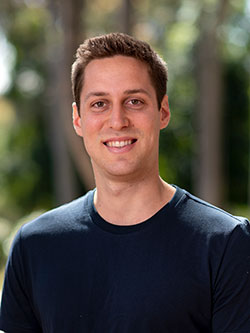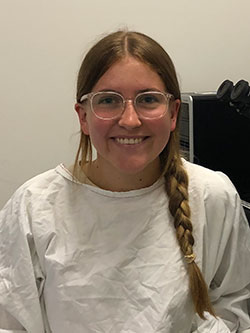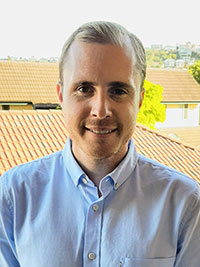Scholarships to boost academic careers for 132 PhD students
The University of Newcastle today recognised the recipients of the prestigious Vice-Chancellor’s Training Priority Scheme, aimed at providing a pathway for Honours students to undertake a PhD and gain teaching skills to enhance their academic career prospects.
The 3.5 year scholarship, presented to 132 students, includes acceptance into the Academic Career Preparation (ACP) pathway to complete alongside their PhD. Of the 132 scholarships awarded, 50 were in the first round in 2020 but COVID restrictions prevented a formal presentation from being held last year.
The ACP enables candidates to develop a portfolio of academic experiences, including core competencies in university teaching. Students complete 12 modules designed to develop their teaching skills in readiness for an application as an Associate Fellow of AdvanceHE, an international recognition of tertiary education capability.
The University of Newcastle Vice-Chancellor and President, Professor Alex Zelinsky AO, said the scholarship aimed to retain and develop the best and brightest students in the region and beyond.
“We have some exceptional minds at our university and this scholarship offers students a great opportunity to further their research interests and develop their academic careers,” Professor Zelinsky said.
“Each of these students has demonstrated their talent and commitment through their undergraduate and Honours studies and we want to foster and develop that talent for the benefit of our regions and beyond.”
Recipients of the scholarship represent a broad range of academic disciplines and their research projects cover diverse topics. These include the influence of taste function and mood and cognition, the role of social media in creating divisive communities, the influence of female hormones on expression of asthma, the impact of criminalisation processes on first nations people and Australia’s defence relationships with declining powers.
The Vice-Chancellor’s Training Priority Scheme is a key pillar of the ‘life ready graduates’ component of the University’s Looking Ahead Strategic Plan 2020-2025.
“We recognise the rapidly changing environment our students will be entering when they graduate so we offer an education experience that will help develop life-ready graduates who are community-minded, resilient and ready for work,” said Professor Zelinsky.
The Vice-Chancellor’s Training Priority Scheme is supported by the Australian Government Research Training Program.
A selection of students and their research projects
Celeste Ferraris
 Celeste is studying in the School of Environmental and Life Sciences. We understand that sweet things can make you feel good but there is also evidence that salty and sour taste can set off neurotransmitters that affect us in other ways. Celeste is looking at the genetics of taste and its relationship with both cognitive function and mood.
Celeste is studying in the School of Environmental and Life Sciences. We understand that sweet things can make you feel good but there is also evidence that salty and sour taste can set off neurotransmitters that affect us in other ways. Celeste is looking at the genetics of taste and its relationship with both cognitive function and mood.
Jarrod Sansom
 Jarrod is a student of Communication and Media Studies. His Honours project showed that Facebook use can cultivate ‘us against them’ attitudes between social groups. His PhD research looks at the climate change debate as a case study in this dynamic. Through analysis of the content of Facebook posts and in-depth interviews with Facebook users, he is investigating this potential division in society further.
Jarrod is a student of Communication and Media Studies. His Honours project showed that Facebook use can cultivate ‘us against them’ attitudes between social groups. His PhD research looks at the climate change debate as a case study in this dynamic. Through analysis of the content of Facebook posts and in-depth interviews with Facebook users, he is investigating this potential division in society further.
Olivia Carroll
 Olivia is a student with the School of Biomedical Sciences and Pharmacy. Her PhD research looks at the role of hormones and hormone regulation on the expression of asthma. Her focus is on female hormones, prompted by the observation that women taking oral contraceptives tend to rely less on their steroid inhaler to control asthma.
Olivia is a student with the School of Biomedical Sciences and Pharmacy. Her PhD research looks at the role of hormones and hormone regulation on the expression of asthma. Her focus is on female hormones, prompted by the observation that women taking oral contraceptives tend to rely less on their steroid inhaler to control asthma.
James Garlick
 James is a student with the School of Humanities and Social Sciences. His research is a history thesis titled Australia and Weary Titans: Australia’s Defence Relationship with Great Powers in Decline, 1870-1970 and 2008-2020. He is comparing Australia’s defence relationship with Britain when it was a declining great power to Australia’s current defence relationship with the USA.
James is a student with the School of Humanities and Social Sciences. His research is a history thesis titled Australia and Weary Titans: Australia’s Defence Relationship with Great Powers in Decline, 1870-1970 and 2008-2020. He is comparing Australia’s defence relationship with Britain when it was a declining great power to Australia’s current defence relationship with the USA.
Shelly McGrath
 Shelly studies at the University’s Wollotuka Institute, which specialises in Indigenous education. She is researching the impacts of systemic criminalisation processes and the ongoing denial of sovereignty which marginalise First Peoples in colonial states. Shelly’s research argues that a shared understanding of Indigenous knowledge systems would create opportunities for better outcomes for all.
Shelly studies at the University’s Wollotuka Institute, which specialises in Indigenous education. She is researching the impacts of systemic criminalisation processes and the ongoing denial of sovereignty which marginalise First Peoples in colonial states. Shelly’s research argues that a shared understanding of Indigenous knowledge systems would create opportunities for better outcomes for all.
Related news
- Launch of the School Students’ Statement on the Right to a Healthy Environment
- Funding boost to technology for lower emission steel
- Newcastle team on mission to improve childhood cancer outcomes
- Shanae’s passion for caring delivers her dream to work in health
- Food and nutrition degree serves Keren a rewarding career
The University of Newcastle acknowledges the traditional custodians of the lands within our footprint areas: Awabakal, Darkinjung, Biripai, Worimi, Wonnarua, and Eora Nations. We also pay respect to the wisdom of our Elders past and present.